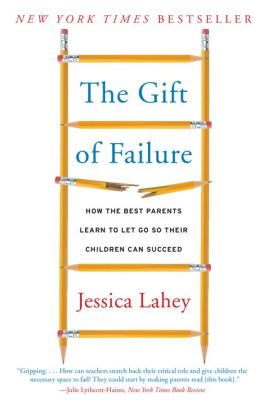
Does anyone else remember a day when getting a trophy meant more than just showing up? Who remembers getting in trouble at school then feeling immediate dread at the prospect of going home to face the parents? That’s the way things were for kids growing up in the seventies and eighties, but kids today have a much different experience. They are used to being praised and rewarded for frivolous things and having their parents get mad at teachers when something goes wrong at school, rarely putting the responsibility on the child. Chores? Not an issue, Mom and Dad will do it. Homework too hard? Well, Mom and Dad will probably do that, too. Author and educator Jessica Lahey tells us it’s time to stop. In her book, The Gift of Failure: How the Best Parents Let Go So Their Children Can Succeed, Lahey uses her own parenting experience and years of dealing with students to gently remind parents just how capable and resilient children really are when given the chance to succeed and, often, fail on their own. This is a book parents of this generation really need. We are so busy being our child’s primary protector we’ve forgotten how to let our children learn through trial and error. Just as we learned lessons from our own failures that helped us become the well-adjusted, contributing members of society we are today, our kids need to be given the opportunity to fail so they can learn those lessons themselves.
Lahey is passionate about helping children learn to succeed and it comes through in every page. In the first part of this book, she states her case, and, yes, she has plenty of evidence to support it. She shares her own aha moment when she realized she was not letting her own sons experience the gift of failure and candidly shares how she and her husband took steps to correct their parenting style. Spoiler alert, her oldest son was already in his teens, and it was a difficult adjustment, but they all survived. Lahey points out the flaws in the current trend of encouraging parents to fight their children’s battles and protect them from every perceivable harm (real and imagined). This doesn’t help children become problem solvers, and it doesn’t help with their self-confidence either. She even points out the real reason many parents can’t let children succeed or fail on their own merits, and it’s a hard pill to swallow. In today’s society, many parents link their children’s success to their own. Lahey says it is time to separate our successes from our children’s and allow them to live their lives their way (with loving parental guidance and appropriate boundaries). She assures parents their children will be more prepared for adulthood, and their relationships with their children will be stronger for it.
By the end of part one, the reader will have a much clearer understanding of autonomous parenting, the concept of raising children in a supportive environment but allowing them to age-appropriately self-govern themselves, and most parents will be ready to think twice before delivering the forgotten homework assignment to school and bailing out the child who should have planned ahead. But, the really practical help comes in the second part of the book. Each chapter in part two covers a specific topic and shows parents how autonomous parenting can be applied to the situation. Some of the topics covered include the importance of letting children choose their own friends, being the right kind of sports parent, chores (or, as Lahey calls them, family contributions), and putting children in charge of their own academic success. Grades and homework have their own respective chapters, and parent-teacher relationships are covered thoroughly as well. There are even chapters specific to middle school and high school for parents who are getting into autonomous parenting a little later in the game. Lahey’s unique perspective as both a mom and an educator keep these topics well-balanced. She knows her profession, and she knows exactly what works and what doesn’t when it comes to helping children and teenagers excel in school and life.
The truth is we all want our children to know how to persevere in the face of failure. We want our children to grow into adults who can handle whatever life throws our way, but it isn’t easy to watch our children suffer the consequences of their own mistakes. Jessica Lahey gives us permission to stand back and let the failures come then she teaches us how to love our children through the initial pain and watch as the pain of failure gives way to later successes, because those later successes and all the problem-solving it takes to get to them are the real gift of failure.
